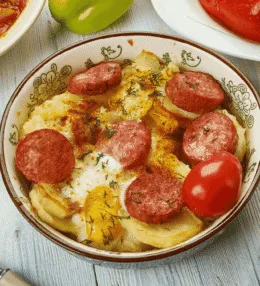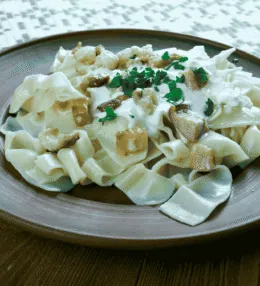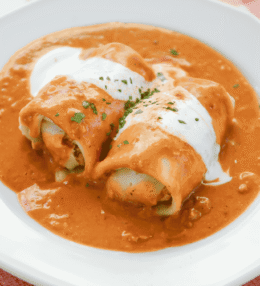
- View
Table of Contents
ToggleKue Lumpur is a soft, fragrant cake that holds a special place in Indonesian kitchens. Its name, which translates to “mud cake”, might raise eyebrows at first, but it refers to the cake’s smooth, rich texture rather than its appearance.
Served warm or at room temperature, it’s often found at family gatherings, market stalls, or casual teatime spreads. The cake’s gentle sweetness and custard like softness make it an easy favourite for both young and old.
Light on the outside and creamy at the centre, Kue Lumpur carries flavours that feel comforting yet slightly indulgent. With coconut milk and vanilla at its core, it’s a dessert that leaves a lasting impression without being overpowering.
Want to dive deeper into Indonesian Cuisine? Don’t miss our post on 31 Traditional Indonesian Foods to Try
What Is Kue Lumpur?
Kue Lumpur is a baked or pan cooked cake made primarily from flour, mashed potatoes, coconut milk, and eggs. The result is a soft, pudding like texture with a golden surface and a subtle scent of vanilla and pandan.
The batter is usually poured into small moulds, then cooked slowly until set. Some versions are topped with slices of young coconut or raisins, adding variety in texture and a touch of sweetness to the mild base.
Typically enjoyed as a snack or dessert, it’s served in small portions that highlight its richness without overwhelming. Despite its soft appearance, it holds its shape well, making it perfect for sharing at gatherings or special occasions.
Ingredients and Taste
The main ingredients include mashed potatoes, plain flour, coconut milk, sugar, eggs, and butter. Pandan or vanilla is often added for aroma. Potatoes give the cake its signature softness and density without making it heavy.
Coconut milk is the heart of the flavour. It brings a gentle richness and creamy mouthfeel, while the eggs help bind everything into a silky smooth batter. A small amount of sugar adds balance without becoming too sweet.
The taste is mellow and slightly buttery, with a delicate fragrance that lingers. Each bite offers a smooth, custard like texture. Toppings like raisins or tender coconut strips break up the softness and add a pleasant contrast.
A Taste of History
The exact origin of Kue Lumpur is not widely documented, but it is thought to have been influenced by European style custards and puddings introduced during the colonial era. Indonesian cooks adapted those ideas using local ingredients.
By replacing cream with coconut milk and incorporating root vegetables like potatoes, they created a dessert that suited local tastes and available produce. Over time, it became its own tradition rather than a borrowed recipe.
Today, Kue Lumpur is most closely associated with Java, though you’ll find it across the country. It remains a staple in markets and homemade celebrations, often passed down through generations in handwritten recipe books.
Though humble in presentation, Kue Lumpur reflects a quiet mastery of balance. It brings together simple ingredients in a way that feels both nostalgic and refined, offering a taste of Indonesia’s culinary creativity and cultural depth.
How to make Kue Lumpur
Kue Lumpur is a soft, custard like cake with a creamy texture and delicate aroma of coconut and vanilla. Traditionally enjoyed as a teatime treat or sweet snack, it combines mashed potato and coconut milk into a silky batter, finished with raisins and a subtle hint of nutmeg. See the recipe card at the bottom for printable directions
Ingredients
For the batter
- 250g mashed potato (smooth, no lumps)
- 100g plain flour
- 125g caster sugar
- 2 large eggs
- 300ml coconut milk
- 50ml water
- 1 tsp vanilla extract
- 1 tbsp unsalted butter, melted
- 1⁄4 tsp salt
- 1⁄4 tsp ground nutmeg (optional, traditional for added warmth)
For topping
- Raisins or thinly sliced young coconut (as garnish)
Cooking Instructions
Step 1: Preheat and prepare moulds
To begin, preheat your oven to 175°C (fan assisted). Lightly grease small tart moulds or use a muffin tray. Set aside while you prepare the batter.
Step 2: Mash and cool the potato
Ensure the mashed potato is smooth and fully cooled. Lumpy or hot potato can affect the cake’s texture. Use a fine sieve or potato ricer for the best result.
Step 3: Blend wet ingredients
In a large bowl, whisk together eggs, coconut milk, vanilla extract, water, and melted butter. Beat gently until fully combined. Proceed to dry ingredients.
Step 4: Combine dry ingredients
Sift plain flour, sugar, salt, and nutmeg (if using) into the wet mixture. Whisk until the batter is smooth and free from lumps. Stir in mashed potato and mix until fully incorporated.
Step 5: Rest the batter
Let the batter rest for 10 minutes to allow air bubbles to settle. This helps the cake bake with an even, smooth surface. Prepare your baking tray during this time.
Step 6: Pour into moulds
Pour the batter into greased moulds, filling each about three quarters full. Tap each mould lightly on the counter to release any trapped air. Prepare the toppings next.
Step 7: Add toppings
Place 2 or 3 raisins on top of each cake or add a few shreds of young coconut for an authentic finish. This adds texture and a visual cue to the classic version.
Step 8: Bake the cakes
Bake in the centre of the oven for 25–30 minutes or until the surface is set and edges turn pale golden. Insert a toothpick to check doneness; it should come out clean.
Step 9: Cool before unmoulding
Let the cakes cool in the moulds for 10 minutes. Carefully loosen the edges with a small knife and remove gently to avoid breaking their soft centres. Move to plating.
Final step: Serve warm or chilled
Kue Lumpur can be served warm for a soft, pudding like texture, or chilled for a firmer bite. Best paired with jasmine tea or black coffee. Garnish with extra coconut if desired.
Variations and substitutions
- Use pandan extract instead of vanilla for a fragrant green version.
- Substitute mashed sweet potato for a deeper flavour and colour.
- Top with slices of banana or jackfruit for regional twists.
Cooking Tips for Perfect Kue Lumpur
- Use waxy potatoes and mash finely to avoid grainy texture.
- Rest the batter to reduce surface bubbles when baking.
- Don’t overbake – the cakes should remain moist and tender inside.
- Choose fresh, high fat coconut milk for best richness and aroma.

Indonesian Kue Lumpur (Coconut Milk Cake)
Ingredients
For the batter
- 250 g mashed potato smooth, no lumps
- 100 g plain flour
- 125 g caster sugar
- 2 large eggs
- 300 ml coconut milk
- 50 ml water
- 1 tsp vanilla extract
- 1 tbsp unsalted butter melted
- 1/4 tsp salt
- 1/4 tsp ground nutmeg optional, traditional for added warmth
For topping
- Raisins or thinly sliced young coconut as garnish
Instructions
- To begin, preheat your oven to 175°C (fan assisted). Lightly grease small tart moulds or use a muffin tray. Set aside while you prepare the batter.
- Ensure the mashed potato is smooth and fully cooled. Lumpy or hot potato can affect the cake's texture. Use a fine sieve or potato ricer for the best result.
- In a large bowl, whisk together eggs, coconut milk, vanilla extract, water, and melted butter. Beat gently until fully combined. Proceed to dry ingredients.
- Sift plain flour, sugar, salt, and nutmeg (if using) into the wet mixture. Whisk until the batter is smooth and free from lumps. Stir in mashed potato and mix until fully incorporated.
- Let the batter rest for 10 minutes to allow air bubbles to settle. This helps the cake bake with an even, smooth surface. Prepare your baking tray during this time.
- Pour the batter into greased moulds, filling each about three quarters full. Tap each mould lightly on the counter to release any trapped air. Prepare the toppings next.
- Place 2 or 3 raisins on top of each cake or add a few shreds of young coconut for an authentic finish. This adds texture and a visual cue to the classic version.
- Bake in the centre of the oven for 25–30 minutes or until the surface is set and edges turn pale golden. Insert a toothpick to check doneness; it should come out clean.
- Let the cakes cool in the moulds for 10 minutes. Carefully loosen the edges with a small knife and remove gently to avoid breaking their soft centres. Move to plating.
- Kue Lumpur can be served warm for a soft, pudding like texture, or chilled for a firmer bite. Best paired with jasmine tea or black coffee. Garnish with extra coconut if desired.
Nutrition
You May Also Like









Leave a Review